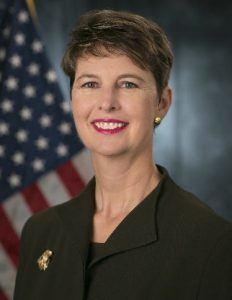Assistant U.S. trade commissioner talk opportunities, hurdles with Wal-Mart, business owners
by July 21, 2017 9:28 am 486 views

Brenda Smith has been in Northwest Arkansas since Tuesday (July 18) meeting with Wal-Mart CEO Doug McMillon and touring the retailer’s distribution center in Bentonville to learn about its logistics system. She also met with small business owners from around the state Thursday (July 20) at the World Trade Center in Rogers to discuss trade opportunities and challenges.
In her role as executive assistant commissioner for the Office of International Trade at the U.S. Customs and Border Protection (CBP), Smith is responsible for the compliance of millions of cargo shipments that flow in and out of the U.S. each year. Smith told Talk Business & Politics she is working to streamline the protocol for small companies looking to sell abroad.
“CBP has a fairly broad mission mainly focused on national security, part of which is economic security. As we think about economic security a key component is to ensure U.S. businesses have a level playing field to compete on that if they are importing goods and following the rules that everyone is also following the rules,” Smith told Talk Business & Politics following her Thursday meeting.
One of the biggest problems Smith said CBP faces is counterfeit goods, which have become harder to detect in the e-commerce age when much of the cargo consists of small packages. She said illicit drugs are sometimes found in the small packages along with counterfeit cargo that has been ordered online from U.S. shoppers.
Smith said the CBP seized about 32,000 shipments last year and three quarters of it hailed from mainland China and Hong Kong. She said many of the confiscated packages were singled out in the air express shipment environment or with the international mail shipments. Smith said they have special teams called mobile intellectual property enforcement teams – MIPET – who train port workers on how to better detect counterfeit and illegal items.
“We may know there is a new iPhone coming out or last year it was hoverboards that workers are then trained to look for. We were in the international mail branch in Puerto Rico last month and saw lots of high dollar watches and counterfeit handbags coming in. In that case we send an enforcement team to that area with one or two experts on that type of cargo who then can train those in the port about what to look for in these counterfeit goods,” Smith said.
She said port officials also have their own systems. For instance they may notice frequent violations with packages from a certain address. The address and other package info is sent to other ports of entry. Smith said they look for addresses of origin and other signs such as packing tape that has been flagged in the past, but the problem of counterfeiting goods continues to escalate.
“We have just completed an ad campaign in five or six or the largest airports in the U.S. trying to educate travelers about the risks of buying counterfeit goods abroad. Many times it’s batteries that catch fire, which happened in some hoverboards and phones bought by U.S. consumers abroad,” Smith said. “We use a variety of ways to try and crack down counterfeiters. It’s education, data analysis and investigative approaches as well as enforcement. I am concerned that e-commerce presents an additional set of challenges when it comes counterfeiting.”
INFORMATION NEEDED
She said one area of focus is to ensure it has enough information about the plethora of products that flow through the e-commerce supply chain. She said information the agency seeks out in advance of shipment would include what the product is, who made it and where it originated. They can then assess any risk associated with that package.

“If we get that information we can usually do a pretty good and reasonable job of understanding if it presents risk or a threat to our safety and security,” Smith said. “With e-commerce there is usually less of that information as the products are coming from businesses that may not have participated in exports and imports in the past. We want to make the people who are participating understand what the rules are and that they follow them. Simpler rules are often better than complicated ones.”
Smith said small packages don’t often have enough information and that’s a problem given the number of small packages being handled. She said as more entrepreneurs sell their goods online, it is often one person responsible for making the product, getting it on a truck or plane and to its end user. Smith said customs regulations have been complicated and cumbersome for small businesses, but they must comply with the law if they are going to sell goods abroad.
“I would like for the U.S. government to meet these businesses halfway so they can understand what the law requires,” Smith said.
She said customs brokers are able to help smaller businesses who trade abroad. But if they can’t hire a customs broker then she recommends the business search the CBP website where the rules and regulations are defined and explained. She said small businesses are requiring the agency to simplify its communication strategy.
“We also have 10 Center of Excellence in Expertise which can also be a resource or small businesses to use,” Smith said.
When asked if the agency is working to automate any of its processes in its simplification strategy, she answered “not yet.”
Smith said the agency has tested a “Unified Cargo Process” for about a year and she said and it is being well received by businesses, especially those shipping produce where days matter from picking to store delivery and ultimately customer consumption.
Smith said customs officers from the U.S. and Mexico are working in the same center examining the cargo going and coming from their respective countries in one stop. She said each customs officer checks to make sure the package does not pose any risk and passes the appropriate protocol per their country. Doing it in the same location speeds up the process.
TRADE TALKS
Talk Business & Politics also asked her about the controversial border adjustment tax recently discussed in Congress.
“The proposal garnered some strong opinions from the trade community but CBP does not have an opinion on this issue. … It is not clear to us how the border adjustment tax would be structured and when the most efficient time to collect this tax would be, upon entry or later as part of tax filing. Until we get more information about how this proposed tax would work it’s hard to have opinion on the operational effectiveness,” Smith said.
One area getting a lot of focus is the so-called modernization of the North American Free Trade Agreement, which is being dubbed NAFTA 2.0. Smith said the agency plays a role in identifying the regulations and providing information to the trade community that wanted to take advantage of the trade agreement and enforcing elements of the agreement.
Lastly, Talk Business & Politics asked the commissioner the on-and off-again attitudes about trading with Cuba from the the past two presidential administrations.
“With respect to Cuba we are doing a couple of things. We are making sure we are very aware of the discussions so that we can be ready to support the guidance that is given us. If the guidance is that the U.S. will open X-number of airports from travelers coming from Cuba then we stand ready to do that. If the guidance is we that we will now allow the shipment of U.S. agricultural products to Cuba and vice versa some finished goods from Cuba then we will support those with any conditions that go around that,” Smith said.
She said decisions on the sensitive issues are made well above her pay grade but the agency can provide those making the decisions with an idea of how their policy goal might work in the real world. Smith said the agency will likely be involved in the discussions as it pertains to implementation of policy.
“My understanding is the U.S. position is still encouraging the growth of a robust private sector in Cuba. To me that could potentially mean trade so we are engaged with the U.S. trade rep and the Department of State to find out if they are talking trade and what they are trying to accomplish.”
